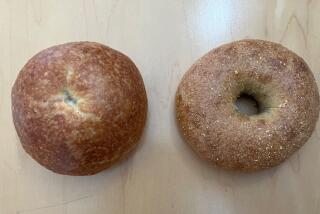Heartburn’s a symptom, not a disease
I am a gastroenterologist. I research, diagnose and treat digestive disorders. Those disorders include heartburn, also known as acid reflux or, if you really want to scare the customers, gastroesophageal reflux disease. I am also a heartburn sufferer. Sometimes.
I used to be a pretty frequent heartburn sufferer. A few years ago, when I was intent on being a “gastroenterologist’s gastroenterologist,” I was seeing lots of patients, competing for funding to do research and writing and presenting papers.
It was a busy, hectic, exciting life. It was also stressful, and I am a stress eater. I love sweets. Absolutely love them. As a result, I managed to pack 245 pounds onto my 6-foot-2-inch frame. Suddenly I was on a medication for blood pressure and cholesterol. I felt crummy. I had no energy, slept poorly and was unhappy bordering on depressed.
And did I have heartburn. Big time. Acid-in-the-chest, sometimes-in-the-mouth, wake-you-up-in-the-middle-of-the-night heartburn. So I did what Larry the Cable Guy (I sort of looked like him at the time) told me I should do: I took Prilosec.
I mean, if you take Prilosec, you can eat whatever you want, right? Of course you can. And you can continue to get fatter and keep on having reflux, except it doesn’t burn as bad. So you feel better — but the blood pressure and cholesterol and general sense of well-being are worse because you keep eating crappy foods, and you keep sitting on your butt and you keep eating more. But you’re cured of gastroesophageal reflux disease.
Except you aren’t, really. It’s still happening. It just isn’t as annoying.
I finally had an epiphany. As I was running on the hamster wheel that was my life, I realized that not one of the folks telling me how well I was running or how I should run faster was going to come to my funeral when I dropped dead because my fat, non-exercising carcass finally had the Big One. They’d just go find some other schmuck and get him on the wheel. So I got off.
I still worked hard, but I started playing sports again and exercising and following a reasonable diet. (What’s a reasonable diet? Walk into a cafeteria and look at all the people you don’t want to look like. See what’s on their plates and how much, and don’t eat like that. Now look at all the people you want to look like. See what’s on their plates, and eat that way. Simple.)
Over a couple of years, I got down to 170 pounds. Guess what? No more high blood pressure. No more high cholesterol. No more pills. No more bad sleep. No more poor energy. And no more heartburn.
The body is an amazing machine. If you twist your ankle, it hurts and you take it easy. If you encounter a situation similar to one that was threatening or scary in the past, you get a jolt of apprehension and think twice. And if you eat too much, you get heartburn.
Heartburn is not a disease. It is a symptom, a sign. Most often, it’s a message that you’re operating outside your body’s specifications: Please stop doing that. Or as my father said, “Stupidity is supposed to be painful.” (“Doctor, it hurts when I do that. What should I do?” It’s usually at this point in the office visit that I can start to taste the blood from biting my lip.)
Heartburn is your friend. It’s a warning that you’re courting high blood pressure, adult-onset diabetes and heart disease. It’s a risk factor for a lot of cancers and poor outcomes for almost any condition you’d care to list. (Does any of that sound like the American healthcare crisis to you?) Today’s heartburn after six slices of pizza is tomorrow’s crushing chest pain when you go face down in the meatballs.
So why suppress a symptom that’s analogous to the engine light flashing on the dashboard of your car? And why would I, as a physician, offer you a therapy that could perpetuate dangerous behavior? The medical profession and healthcare industry made heartburn a disease because it was a common problem with an easy and profitable fix. But it’s so shortsighted that it’s frightening.
Recently, I changed jobs and I’m working more, eating more and exercising less. I’ve gained about 10 pounds. Guess what? My heartburn has started to come back. I thought about getting some Prilosec, but I had a little moment of clarity and I heard the voice: “Put down the fork and step away from the table. And get your butt outside and get a little exercise.”
Those are the words of a physician who sees the big picture and who truly cares for his patient. And himself.
The healthcare crisis is largely self-inflicted. We need to own our behaviors. We need a healthcare system that rewards good choices and makes bad ones less attractive. People talk about “gateway drugs” that lead to serious addictions and adverse behaviors. Well, heartburn could be classified as a “gateway symptom,” a harbinger of morbid and mortal events to come. You, me and the medical profession would do well to embrace that reality rather than the pills that temporarily hide it.
Michael P. Jones is in private practice in Virginia.
More to Read
A cure for the common opinion
Get thought-provoking perspectives with our weekly newsletter.
You may occasionally receive promotional content from the Los Angeles Times.






